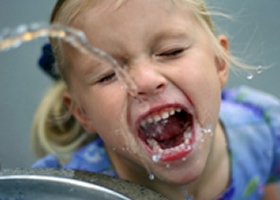Article at a Glance
• Being out in the heat too long can cause serious heat-related illnesses.
• Watch children carefully to make sure they are not getting too hot and that they are getting plenty of liquid.
• Teach your children how to recognize when they are overheated.
We’ve been waiting for the sun to come out all winter, but it is important to remember that being out in the heat too long can cause serious heat-related illnesses.
The best thing parents can do to protect their children is prevention, prevention, prevention.
1. Watch children carefully to make sure they don’t get too hot and that they get plenty of water even if they’re not thirsty.
2. Avoid strenuous outdoor activity from noon to 6:00 PM.
3. Wear light-colored, loose clothing to help reduce body heat.
4. Don’t leave your children alone in the car. On a hot day, the inside of a car can reach a potentially fatal 125° F in only 20 minutes.
5. Most importantly, teach your children how to recognize when they feel overheated. If they feel really hot, tired, or weak, teach them to get out of the sun and drink plenty of liquid.
Usually using caution can prevent any serious heat-related illness, but sometimes things like unusually high temperatures can allow our internal body heat to reach dangerous levels. When this happens, we can get heat cramps, heat exhaustion or heat stroke.
Heat Cramps
Heat cramps aren’t serious, but they are uncomfortable. They occur when we lose too much salt from sweating. The low level of salt makes our muscles cramp up. The best way to avoid heat cramps is by drinking lots and lots of water.
Treatment: The best thing for heat cramps is to get out of the heat, rest, and drink lots of fluids.
Heat Exhaustion
Heat exhaustion is more serious than heat cramps. Symptoms usually include nausea, vomiting, fatigue, dehydration, clammy skin, headache, hyperventilation, and irritability.
Treatment: Bring your child indoors where it is cool and loosen or remove clothing. Give your child a cool (not cold) bath to help bring the body temperature down. Be sure to call your pediatrician for advice — heat exhaustion can lead to heatstroke if untreated.
Heat Stroke
Heat stroke can be life-threatening. Heat stroke occurs when the body can no longer control its temperature. When the body temperature rises above 106° F it can lead to brain damage and eventually death. Symptoms include flushed, hot, dry skin with no sweating; a temperature over 104° F; a severe headache; weakness; dizziness; confusion; fatigue; seizures; diminished responsiveness; and loss of consciousness.
Treatment: Call 911 and get your child to a cool location. Do NOT give your child any fluids. While waiting for help, undress your child and apply cool water to the skin.
For more information:
Heat Cramps: First Aid (Mayo Clinic)
